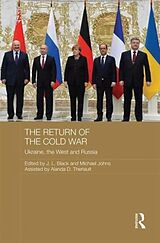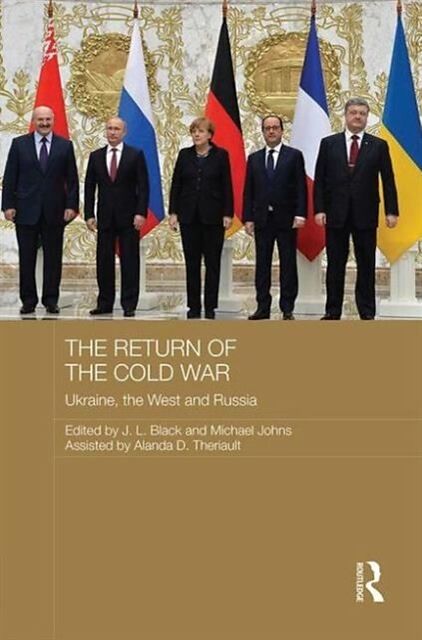The Return of the Cold War
Einband:
Fester Einband
EAN:
9781138924093
Untertitel:
Ukraine, The West and Russia
Genre:
Ethnologie
Autor:
J. L. (Laurentian University, Barrie, Ontar Black
Herausgeber:
TAYLOR & FRANCIS
Auflage:
1. Auflage
Anzahl Seiten:
312
Erscheinungsdatum:
14.04.2016
ISBN:
978-1-138-92409-3
Informationen zum Autor J L Black is Professor Emeritus and Distinguished Research Professor of Carleton University, Ottawa, and Director of the Centre for Research on Canadian-Russian Relations with the History Department, Laurentian University, Sudbury, Ontario, Canada Michael Johns is an Associate Professor of Political Science and Vice Dean of Arts at Laurentian University, Barrie Campus, Barrie, Ontario, Canada Klappentext This book examines the crisis in Ukraine and discusses how the two sides have engaged in political posturing, accusations, escalating sanctions and further escalating threats, arguing that the ease with which both sides have reverted to a Cold War mentality demonstrates that the Cold War belief systems never really disappeared. The book assesses why Cold War belief systems have re-emerged so easily, and concludes by considering the likely long-term ramifications of the crisis, arguing that the deep-rooted lack of trust makes the possibility of compromise even harder than in the original Cold War. Zusammenfassung This book examines the crisis in Ukraine, tracing its development and analysing the factors which lie behind it. It discusses above all how the two sides have engaged in political posturing, accusations, escalating sanctions and further escalating threats, arguing that the ease with which both sides have reverted to a Cold War mentality demonstrates that the Cold War belief systems never really disappeared, and that the hopes raised in the aftermath of the collapse of the Soviet Union for a new era in East-West relations were misplaced. The book pays special attention to the often ignored origins of the crisis within Ukraine itself, and the permanent damage caused by the fact that Ukrainians are killing Ukrainians in the eastern parts of the country. It also assesses why Cold War belief systems have re-emerged so easily, and concludes by considering the likely long-term ramifications of the crisis, arguing that the deep-rooted lack of trust makes the possibility of compromise even harder than in the original Cold War. Inhaltsverzeichnis International Relations 1. Assisted Suicide: Internal and External Causes of the Ukrainian Crisis 2. Caught Between Russia and NATO: The EU During and After the Ukrainian Crisis 3 . Belarus in the 'New Cold War': A Promising Mediator? 4. The Crisis in Ukraine and the Ukrainian Diaspora: February-December 2014 Military 5. Brothers Disunited: Russia's Use of Military Power in Ukraine 6. Explaining the Ukrainian Army's Defeat in Donbass in 2014 Economic and Social Considerations 7. Western Economic Sanctions and Russia's East-West Economic Orientation 8. Lost and Forgotten: The Conflict Through the Eyes of the Donbass People Image and Perception 9. Setting the Tone. Misinformation and Disinformation from Kyiv, Moscow, Washington, and Brussels in 2014 10. Shaping New Narratives: How New Histories are Created 11. German Attitudes towards Russia: The Post-Maidan Era in Context 12. The Maidan Massacre in Ukraine: A Summary of Analysis, Evidence, and Findings 13. Conclusion ...
Autorentext
J L Black is Professor Emeritus and Distinguished Research Professor of Carleton University, Ottawa, and Director of the Centre for Research on Canadian-Russian Relations with the History Department, Laurentian University, Sudbury, Ontario, CanadaMichael Johns is an Associate Professor of Political Science and Vice Dean of Arts at Laurentian University, Barrie Campus, Barrie, Ontario, Canada
Klappentext
This book examines the crisis in Ukraine and discusses how the two sides have engaged in political posturing, accusations, escalating sanctions and further escalating threats, arguing that the ease with which both sides have reverted to a Cold War mentality demonstrates that the Cold War belief systems never really disappeared. The book assesses why Cold War belief systems have re-emerged so easily, and concludes by considering the likely long-term ramifications of the crisis, arguing that the deep-rooted lack of trust makes the possibility of compromise even harder than in the original Cold War.
Zusammenfassung
This book examines the crisis in Ukraine, tracing its development and analysing the factors which lie behind it. It discusses above all how the two sides have engaged in political posturing, accusations, escalating sanctions and further escalating threats, arguing that the ease with which both sides have reverted to a Cold War mentality demonstrates that the Cold War belief systems never really disappeared, and that the hopes raised in the aftermath of the collapse of the Soviet Union for a new era in East-West relations were misplaced. The book pays special attention to the often ignored origins of the crisis within Ukraine itself, and the permanent damage caused by the fact that Ukrainians are killing Ukrainians in the eastern parts of the country. It also assesses why Cold War belief systems have re-emerged so easily, and concludes by considering the likely long-term ramifications of the crisis, arguing that the deep-rooted lack of trust makes the possibility of compromise even harder than in the original Cold War.
Inhalt
International Relations 1. Assisted Suicide: Internal and External Causes of the Ukrainian Crisis 2. Caught Between Russia and NATO: The EU During and After the Ukrainian Crisis 3. Belarus in the 'New Cold War': A Promising Mediator? 4. The Crisis in Ukraine and the Ukrainian Diaspora: February-December 2014 Military 5. Brothers Disunited: Russia's Use of Military Power in Ukraine 6. Explaining the Ukrainian Army's Defeat in Donbass in 2014 Economic and Social Considerations 7. Western Economic Sanctions and Russia's East-West Economic Orientation 8. Lost and Forgotten: The Conflict Through the Eyes of the Donbass People Image and Perception 9. Setting the Tone. Misinformation and Disinformation from Kyiv, Moscow, Washington, and Brussels in 2014 10. Shaping New Narratives: How New Histories are Created 11. German Attitudes towards Russia: The Post-Maidan Era in Context 12. The Maidan Massacre in Ukraine: A Summary of Analysis, Evidence, and Findings 13. Conclusion

Leider konnten wir für diesen Artikel keine Preise ermitteln ...
billigbuch.ch sucht jetzt für Sie die besten Angebote ...
Die aktuellen Verkaufspreise von 6 Onlineshops werden in Realtime abgefragt.
Sie können das gewünschte Produkt anschliessend direkt beim Anbieter Ihrer Wahl bestellen.
Loading...
Die aktuellen Verkaufspreise von 6 Onlineshops werden in Realtime abgefragt.
Sie können das gewünschte Produkt anschliessend direkt beim Anbieter Ihrer Wahl bestellen.
| # | Onlineshop | Preis CHF | Versand CHF | Total CHF | ||
|---|---|---|---|---|---|---|
| 1 | Seller | 0.00 | 0.00 | 0.00 |
